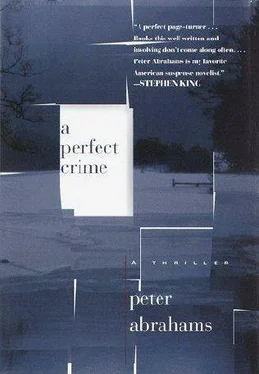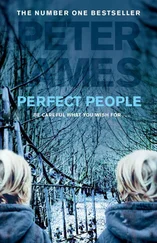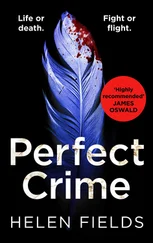Peter Abrahams - A Perfect Crime
Здесь есть возможность читать онлайн «Peter Abrahams - A Perfect Crime» весь текст электронной книги совершенно бесплатно (целиком полную версию без сокращений). В некоторых случаях можно слушать аудио, скачать через торрент в формате fb2 и присутствует краткое содержание. Жанр: Триллер, на английском языке. Описание произведения, (предисловие) а так же отзывы посетителей доступны на портале библиотеки ЛибКат.
- Название:A Perfect Crime
- Автор:
- Жанр:
- Год:неизвестен
- ISBN:нет данных
- Рейтинг книги:4 / 5. Голосов: 1
-
Избранное:Добавить в избранное
- Отзывы:
-
Ваша оценка:
- 80
- 1
- 2
- 3
- 4
- 5
A Perfect Crime: краткое содержание, описание и аннотация
Предлагаем к чтению аннотацию, описание, краткое содержание или предисловие (зависит от того, что написал сам автор книги «A Perfect Crime»). Если вы не нашли необходимую информацию о книге — напишите в комментариях, мы постараемся отыскать её.
A Perfect Crime — читать онлайн бесплатно полную книгу (весь текст) целиком
Ниже представлен текст книги, разбитый по страницам. Система сохранения места последней прочитанной страницы, позволяет с удобством читать онлайн бесплатно книгу «A Perfect Crime», без необходимости каждый раз заново искать на чём Вы остановились. Поставьте закладку, и сможете в любой момент перейти на страницу, на которой закончили чтение.
Интервал:
Закладка:
“Will that work?” Anne asked. Francie saw the blue disk of her eye in profile, inches away: still, waiting for the response.
“At least those fucking knees of theirs are going to ache tonight,” she said. The blue disk brightened, bulged slightly; Anne laughed.
She laughed, but her game did not come back, at least not right away. Her lobs were short, and the wiry women proved adept at putting them away, one of them grunting an annoying little “Ho!” on every overhead. Francie and Anne fell behind 1–3, 1–4.
Anne’s serve. “This isn’t working,” she said as Francie handed her the balls.
“Any other ideas?” said Francie.
“No,” Anne replied, her face pinker than ever. Francie watched a vein throbbing in her forehead. She wanted to say forget whatever’s fucking up your mind and just play. Instead she glanced across the net, saw the opposition waiting restlessly on the other side, eager to get on with the demolition.
“Go with your second serve,” she told Anne.
“What good will that do? They’re clobbering my first.”
“Probably none, but try it.”
Anne tried it. The wiry women, fooled by the change of pace, netted the first two returns. On the next two, they were ready and hit aggressive crosscourt shots, but Francie poached on both and put them away, the second drilling a padded knee and drawing an angry glare-unintentional, on Francie’s part, but somewhere in her heart, she said yes. 2–4.
Anne’s lobs grew stronger and deeper in the next game, forcing the wiry women to scramble in the back-court for the first time in the match. Now Francie and Anne were making the easy putaways. 3–4. Francie’s serve. Four all. Francie and Anne then broke serve again, but Anne, serving for the set, double-faulted twice. Both sides held after that and they went to a tiebreak.
A long tiebreak, full of jittery errors on both sides, kept alive by an outrageous out call on the far baseline that brought a surprisingly furious look to Anne’s face.
7-7. “Can you believe that call? It was in by a foot.”
“Anne?”
“Yes?”
“Just win this point.”
Their eyes met. Francie thought she saw through the doubtful outer person to a stronger one inside. Anne nodded.
Next serve to Francie, a spinner into the body. She hit a weak return, picked off at the net, angled at Anne’s feet. But Anne made one of her miraculously quick reflexive shots, catching the ball on her racket, deflecting a soft lob, her best of the match, over outstretched racquets on the other side, landing indisputably within the lines for a winner.
“Beautiful,” said Francie, suddenly filled with the feeling-rare for her, but the greatest pleasure the game had to give-that she could do anything she liked with the ball.
She took two of them from Anne, put one in her pocket, bounced the other a few times, tossed it up, bent her knees. The ball reached the top of its arc and seemed to pause. With all the time in the world, Francie hit it in the bottom right quadrant as hard as she could: an ace down the middle.
“Oh, yes, Francie.”
Match tied at one set apiece.
But it was really over, probably decided somewhere in the middle of the second set, perhaps at the moment Francie volleyed the ball off that padded knee. Francie and Anne began playing better and better; the wiry women, their soft game beaten, had no fallback. In what seemed like a few minutes, Francie and Anne went up 5–0, 40–15 in the third set.
Anne serving at match point. To the backhand. One last lob, a good one, over Francie’s head. She went back to take it, calling, “Got it.”
Anne came across behind her: “Mine.”
“Got it.”
“Mine.”
They were both in midswing when Francie ran her over. A cry of pain from Anne; their racquets collided-but somehow struck the ball, which arced toward the net, ticked off the tape, and dropped untouched on the other side. Game, set, match.
Anne lay on the court, face ashen, lips blue. She sat up, tried to rise, could not. Francie knelt beside her. “What hurts?”
“Ankle. What if I can’t go on?”
“Don’t have to. We won.”
“That went over?”
“Yup.”
Anne made a fist, almost pumped it.
Francie sat on the court, gently removed Anne’s shoe, rolled off her sock, and supporting the weight of Anne’s leg in her lap, examined the ankle.
Shadows loomed over them. “Did you hear a cracking sound?” said one of the wiry women, not quite hiding her satisfaction.
“More like a little rip,” Anne said.
Francie looked at the wiry women pursing their lips. “Nice match,” she said, reached up to shake hands, and asked them to send someone from the desk. They went away. Anne was gazing up at her. “You’ll be okay by Saturday,” Francie said.
“You think?”
“I’ve done that ripping number a hundred times. We’re going to win this goddamn tournament.”
Color began returning to Anne’s face.
But it was her right ankle, and she couldn’t drive. Francie and the desk attendant helped her out to the parking lot, and Francie drove her home in Anne’s car.
“I hate to inconvenience you like this,” Anne said. “My husband will drive you back the minute he gets home.”
“No trouble,” Francie said. “Got anything to drink? Beating a pair like that’s worth a celebration.”
“I never thought we could. You were so cool out there, Francie.”
“I like to compete,” Francie said. True, but not the kind of remark she’d normally make, possible now only with the endorphins flowing through her brain.
“And you were serving so hard-just like Nora.”
“That turns out not to be a compliment,” Francie said. She explained Nora’s Newtonian theory of big hips and hard hitting.
Anne laughed and said, “You know you’ve got a great body.”
“I most certainly do not.”
“Come on-men on the other courts are always looking at you. That’s never happened to me in my whole life.”
Anne lived in Dedham, a small Federal house with a big lawn, not far from the green. Leaning on Francie, she limped up the shoveled walk, unlocked the door. They moved into a little hall, with cut flowers-irises-in a vase beside the mail and a stack of audiotapes. “I’ll get ice,” Francie said, seeing the kitchen straight ahead.
A bright kitchen, with three places set on the table and a note stuck to the fridge: Anne-I’ll handle dance pickup. Back at 8. A note probably written early that morning; Anne’s husband would be tired, in no mood for more driving. Francie checked her watch: twenty minutes to. She opened the freezer, found an ice pack under a container of rocky road ice cream, took it to the living room.
Anne sat in a corduroy-covered chair, her leg up on a footstool. The ankle was more swollen now, but Francie had seen worse. She laid the ice pack on it.
“You’re an angel,” said Anne.
“Does it hurt?”
“No. There’s some wine in the cabinet over the sink, but I don’t think it’s very good.”
“Let’s save it for Saturday night,” said Francie, picking up the phone.
“What are you doing?”
“Calling a cab.”
“Please don’t,” said Anne, glancing out into the darkness. “They’ll be home any minute.”
Francie started dialing.
“Please. I feel guilty enough already.”
Francie paused for a moment, then gave in. She hung up the phone, poured Romanian wine for both of them, sat on the couch.
“To victory,” said Anne.
They drank a toast to victory.
Paintings hung on Anne’s walls, all but one framed re-productions, of no interest to Francie. The one original, partly obscured by a desk lamp, was a still life of a bowl of grapes. She thought at once of oh garden, my garden. This painting had none of its resonance, but the technical skill of the artist was as high, perhaps higher: the grapes glistened, as though they’d just been washed.
Читать дальшеИнтервал:
Закладка:
Похожие книги на «A Perfect Crime»
Представляем Вашему вниманию похожие книги на «A Perfect Crime» списком для выбора. Мы отобрали схожую по названию и смыслу литературу в надежде предоставить читателям больше вариантов отыскать новые, интересные, ещё непрочитанные произведения.
Обсуждение, отзывы о книге «A Perfect Crime» и просто собственные мнения читателей. Оставьте ваши комментарии, напишите, что Вы думаете о произведении, его смысле или главных героях. Укажите что конкретно понравилось, а что нет, и почему Вы так считаете.












